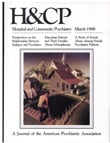An Interdisciplinary Psychoeducation Program for Schizophrenic Patients and Their Families in an Acute Care Setting
Abstract
A psychoeducation program in an acute care inpatient psychiatric setting involves schizophrenic patients and their families in a range of educational interventions that are responsive to their particular strengths and vulnerabiities. Patients receive one-on-one instruction about their illness from a psychiatrist and the nursing staff and learn community living skills in classes and tutorials conducted by occupational therapists. Families discuss ways of coping with the patients' illness in a series of meetings with a social worker, and they attend workshops led by a team of clinicians and an administrator, who advise them of current perspectives on the illness and its management and about how to negotiate the mental health system. A mental health library keeps staff, family, and patients abreast of recent literature about schizophrenia. The authors believe the program prepares patients to live in the community better than do programs whose goals are limited to symptom reduction or crisis intervention.
Access content
To read the fulltext, please use one of the options below to sign in or purchase access.- Personal login
- Institutional Login
- Sign in via OpenAthens
- Register for access
-
Please login/register if you wish to pair your device and check access availability.
Not a subscriber?
PsychiatryOnline subscription options offer access to the DSM-5 library, books, journals, CME, and patient resources. This all-in-one virtual library provides psychiatrists and mental health professionals with key resources for diagnosis, treatment, research, and professional development.
Need more help? PsychiatryOnline Customer Service may be reached by emailing [email protected] or by calling 800-368-5777 (in the U.S.) or 703-907-7322 (outside the U.S.).



